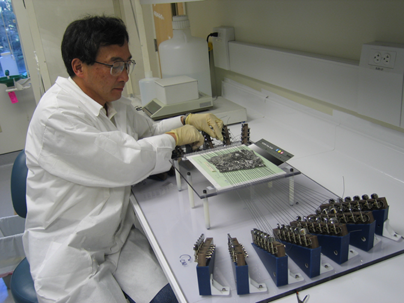General Information
Research in the Cosmochemistry group at UC Berkeley’s Space Sciences Laboratory focuses on cosmic-ray produced (cosmogenic) nuclides, such as 10Be, 26Al, 36Cl, 41Ca, 53Mn, and 129I, in extraterrestrial materials (meteorites, micrometeorites, and lunar samples) and terrestrial materials (rocks, sediments, and polar ice). Our research on extraterrestrial materials increases the understanding of the origin and evolution of the planets and small bodies in the solar system as well as the histories of the cosmic rays and the Sun. The studies of in-situ produced cosmogenic nuclides in terrestrial rocks provide insight in the exposure and erosion histories on the surface of the Earth. Studies of cosmogenic nuclides in polar ice cores provide historical records of solar activity, geomagnetic field, and climate change. Finally, we are involved in analyzing samples from NASA’s Genesis mission, to measure the flux of radionuclides from the Sun, and analyzing samples from the near-Earth asteroids Itokawa, Ryugu and Bennu, that were collected and returned to Earth by JAXA’s Hayabusa and Hayabusa2 missions and NASA’s OSIRIS-REx mission, respectively. In addition, we have prepared and are distributing AMS Standard Reference Materials (SRM) to the AMS community worldwide.
